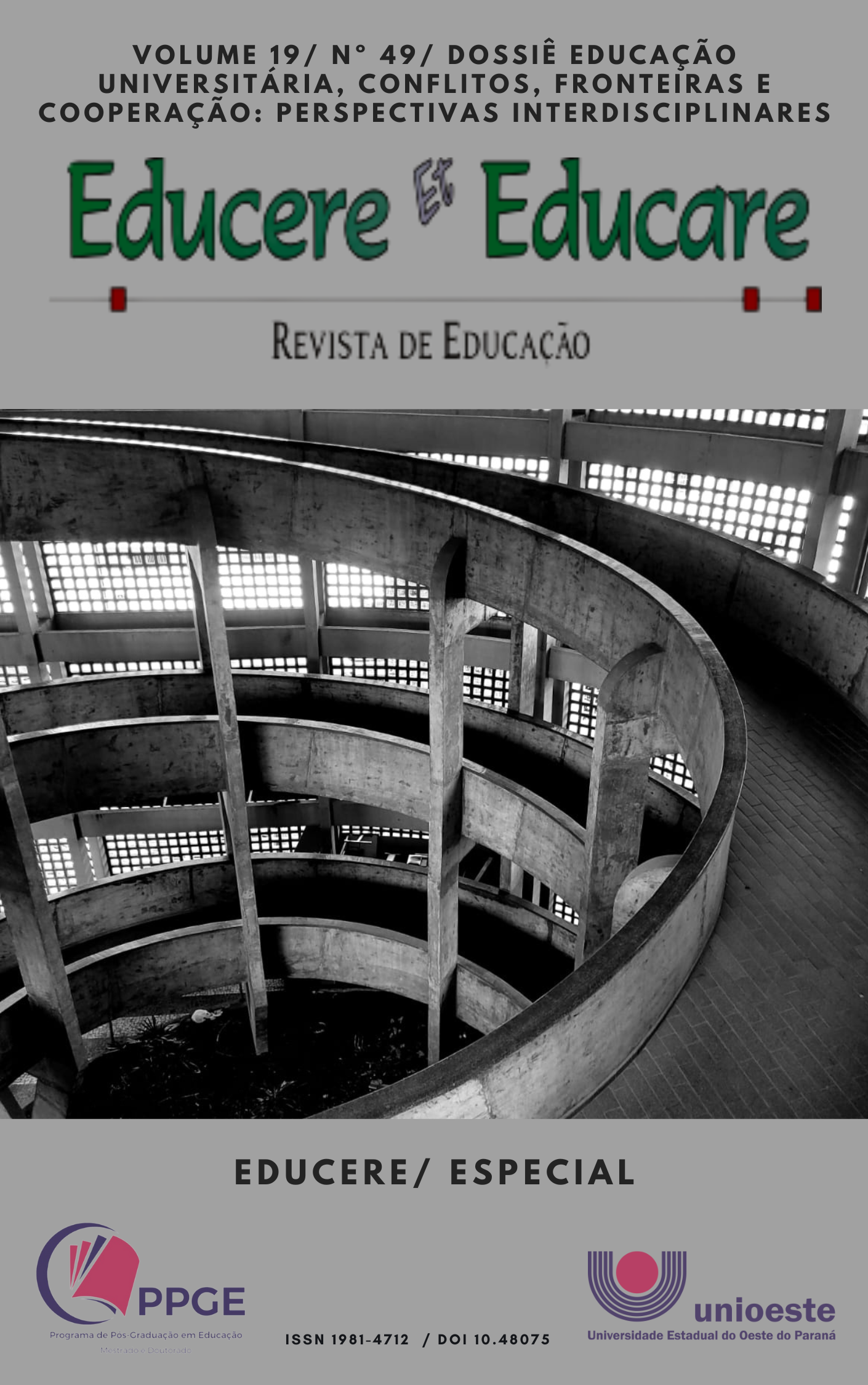Universidade e condição discente: experiências de acolhimento e apoio estudantil
WELCOMING EXPERIENCES AND STUDENT SUPPORT
DOI:
https://doi.org/10.48075/educare.v19i49.32889Palavras-chave:
Universidade; Apoio estudantil; Acolhimento.Resumo
O presente texto almeja apresentar as ações realizadas pela Assessoria de Apoio Estudantil (AApE) do Centro de Educação da Universidade Federal da Paraíba (CE/UFPB) no ano de 2022. A AApE foi criada em 2021 com o objetivo de promover e fortalecer ações institucionais que visam o aprimoramento das experiências discentes em suas jornadas dentro da Universidade. Esta ação é pioneira e vanguardista no CE/UFPB e adota, como eixos norteadores, a comunicação, a orientação e o cuidado humano, fomentados principalmente por parcerias intra-institucionais. No período em questão, a equipe da AApE era formada por dois professores na condição de assessores e uma estagiária estudante concluinte do curso de Pedagogia. Os objetivos principais deste artigo são apresentar as ações desenvolvidas por este setor e analisá-las de maneira crítica e reflexiva. Com o retorno do ensino presencial no segundo semestre de 2022, percebemos uma maior aproximação e envolvimento das/dos discentes nas ações e atividades desenvolvidas pela AApE. Todo esforço da equipe, em parceria com a direção do centro de educação, com as coordenações de cursos de graduação e com o setor de apoio pedagógico, consistiu em fortalecer os vínculos entre os/as estudantes e a universidade, além dos sentidos atribuídos à permanência na instituição, bem como o compromisso ético-político engendrado em suas trajetórias acadêmicas. Em suma, esta experiência reflete a urgência de refletirmos sobre os desafios no ambiente universitário que atingem diretamente o bem-estar de muitas/os discentes do país, mais especificamente na região Nordeste. Ressaltamos que o trabalho desenvolvido apoiou-se na defesa do espaço universitário como lugar acolhedor, fortalecedor de vidas e de transformação social dos sujeitos.
Referências
ALMEIDA, L. S. et al. Envolvimento extracurricular e ajustamento académico: Um estudo sobre as vivências dos estudantes universitário com e sem funções associativas. In: SOARES, A. P. et al. (ed.). Transição para o Ensino Superior. Braga: Universidade de Minho: Conselho Académico, 2002. p. 167-187.
CASTRO, V. R. Reflexões sobre a saúde mental do estudante universitário: estudo empírico com estudantes de uma instituição pública de ensino superior. Revista Gestão em Foco, São Paulo, v. 9, p. 380-401, 2017. Disponível em: https://portal.unisepe.com.br/unifia/wp-content/uploads/sites/10001/2018/06/043_saude_mental.pdf. Acesso em: 20 fev. 2024.
COULON, A. O ofício de estudante: a entrada na vida universitária. Educ. Pesqui., São Paulo, v. 43, n. 4, p. 1239-1250, out./dez., 2017. Disponível em: https://www.scielo.br/j/ep/a/Y8zKhQs4W7NYgbCtzYRP4Tb/. Acesso em: 20 fev. 2024.
FELIX, J.; DE OLIVEIRA, M. L. A educação não-escolar como potencializadora de processos (trans)formativos de jovens universitários/as. Interfaces Científicas, Aracaju, v. 9, n. 3, p. 83-95, 2020. DOI: https://doi.org/10.17564/2316-3828.2020v9n3p83-95.
GOMES, I. Pobreza cai para 31,6% da população em 22, após alcançar 36,7% em 2021. Agência IBGE Notícias, [s. l.], 6 dez. 2023. Disponível em: https://agenciadenoticias.ibge.gov.br/agencia-noticias/2012-agencia-de-noticias/noticias/38545-pobreza-cai-para-31-6-da-populacao-em-2022-apos-alcancar-36-7-em-2021. Acesso em: 20 fev. 2024.
HAN, B. C. Sociedade do cansaço. Tradução de Enio Paulo Giachini. 2. ed. ampl. Petrópolis, RJ: Vozes, 2017.
MACIEL, C. E.; JÚNIOR, M. C.; LIMA, T. S. A produção científica sobre permanência e evasão na educação superior no Brasil. Educ. Pesqui., São Paulo, v. 45, e198669, 2019. DOI: https://doi.org/10.1590/S1678-4634201945198669.
MENEZES, M. Pesquisa identifica o impacto da pandemia em estudantes. [Portal] Fiocruz, [s. l.], 22 nov. 2022. Disponível em: https://portal.fiocruz.br/noticia/pesquisa-identifica-o-impacto-da-pandemia-em-estudantes. Acesso em: 20 fev. 2022.
MUSSI, R. F. F.; FLORES, F. F. Claudio Bispo de Almeida. Pressupostos para a elaboração de relato de experiência como conhecimento científico. Revista Práxis Educacional, [s. l.], v. 17, n. 48, p. 60-77, out./dez. 2021. DOI: https://doi.org/10.22481/praxisedu.v17i48.9010.
RODRIGUES, B. B. et al. Aprendendo com o imprevisível: saúde mental dos universitários e Educação Médica na pandemia de covid-19. Revista Brasileira de Educação Médica, Goiás, v. 44, supl. 1, e0149, 2020. DOI: https://doi.org/10.1590/1981-5271v44.supl.1-20200404.
ROGERS, C. R. Tornar-se pessoa. 6. ed. São Paulo: WMF: Martins Fontes, 2009.
SEMESP. Dados Estados e Regiões. [S. l.]: SEMESP, 2021. Disponível em: https://www.semesp.org.br/mapa/edicao-11/regioes/nordeste/paraiba/. Acesso em: 20 fev. 2024.
UNIVERSIDADE FEDERAL DA PARAÍBA. CENTRO DE EDUCAÇÃO. Sobre o CE. [João Pessoa]: UFPB, 2021. Disponível em: https://ce.ufpb.br/ce/contents/menu/institucional/sobre-o-ce. Acesso em: 20 fev. 2024.
Downloads
Publicado
Como Citar
Edição
Seção
Licença

Este trabalho está licenciado sob uma licença Creative Commons Attribution-NonCommercial-ShareAlike 4.0 International License.
Aviso de Direito Autoral Creative Commons
Política para Periódicos de Acesso Livre
Autores que publicam nesta revista concordam com os seguintes termos:
1. Autores mantém os direitos autorais e concedem à revista o direito de primeira publicação, com o trabalho simultaneamente licenciado sob a Licença Creative Commons Attribution que permite o compartilhamento do trabalho com reconhecimento da autoria e publicação inicial nesta revista.2. Autores têm autorização para assumir contratos adicionais separadamente, para distribuição não-exclusiva da versão do trabalho publicada nesta revista (ex.: publicar em repositório institucional ou como capítulo de livro), com reconhecimento de autoria e publicação inicial nesta revista.
3. Autores têm permissão e são estimulados a publicar e distribuir seu trabalho online (ex.: em repositórios institucionais ou na sua página pessoal) a qualquer ponto antes ou durante o processo editorial, já que isso pode gerar alterações produtivas, bem como aumentar o impacto e a citação do trabalho publicado (Veja O Efeito do Acesso Livre).
Licença Creative Commons
Esta obra está licenciada com uma Licença Creative Commons Atribuição-NãoComercial-CompartilhaIgual 4.0 Internacional, o que permite compartilhar, copiar, distribuir, exibir, reproduzir, a totalidade ou partes desde que não tenha objetivo comercial e sejam citados os autores e a fonte.


